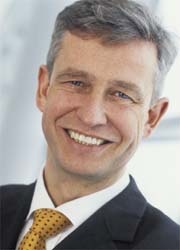Efficiency and ethics in hospitals - a contradiction?
Dr Feldhaus will discuss

After an apprenticeship as a butcher, Dr Stephan Feldhaus studied philosophy, theology and economics at the universities of Munster, Rome, Zurich, then gained his PhD in theology from Munich’s Ludwig-Maximilians-University. Following this he worked at the university as an assistant in the catholic-theological faculty.
He was head of the scientific editorial department of the Bioethics/Ethical Economics magazine in Munich from 1992–98, when he also was a freelance at the Rat von Sachverstaendigen für Umweltfragen in Wiesbaden (a council of experts for environmental matters).
Up to 1998 he also held lecturing positions at Munich, Weihenstephan and Eichstaett universities.
His scientific work regarding ethics focused on economic, environmental and energy technology issues, and has been documented in various publications.
In 1999, Dr Feldhaus joined Siemens AG, in Erlangen, where he became responsible for the Internal Communications department of the Power Generation group. In 2001, he was made head of Group Communications and also represented Power Generation in the Economic Council of Siemens AG.
He was appointed head of Employee Communications and Market Communications within the Corporate Communications department at Siemens AG’s headquarters in Munich, in 2005. Since October 2006 he has headed the Corporate Communications department of Siemens’ Medical Solutions Group.
08.03.2007





